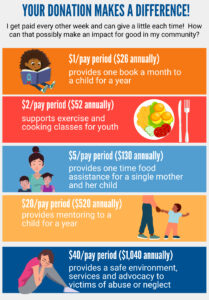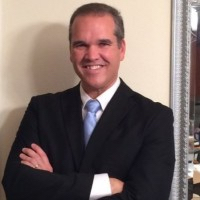Sarasota County ends payroll deduction option for employees.
By Johannes Werner
Original Air Date: Apr. 10, 2024
Host: The United Way is as American as apple pie. Since 1886, this interdenominational charity has been trying to cover the social service gaps left by government, supporting everyone from homeless people to working families. The United Way has the support of corporations and small businesses alike. It has the support of labor unions. It has the support of local governments throughout the United States. But not in Sarasota and Manatee Counties, where commissioners have painted a target on the United Way lately. Our news team filed this report from a Sarasota County commission meeting in Venice yesterday.
Johannes Werner: In a matter of minutes into Commissioner Mike Moran’s report, he and his peers went for the jugular of the non-profit of non-profits in the county, by ending the automatic payroll deduction option of county employees for donations to the United Way.
The system has been in place for decades. It’s been so much part of day-to-day operations in Sarasota County for so long the county attorney was unable to even find the ordinance that created it.
Workplace campaigns are the core mechanism of the United Way’s fundraising efforts. It’s with the support of employers that this charity is able to raise a lot of funds not only for its own programs, but for a whole set of other charities, ranging from the Salvation Army, to Catholic Charities, to the Jewish Federation, to the Boys and Girls Club. And that’s what County Commissioners Moran, Neil Rainford and Joe Neunder are aiming at.
For context, a quick chronology of events here. It’s been a story of escalation. The conflict broke out when Moran, who is on a quest to overhaul the way social services are funded in Sarasota County, convinced his peers last fall to cut the county’s funding for 211. That’s the helpline the United Way invented a quarter century ago, assisting people in crisis with referrals to other agencies – be that a hurricane, a mental health breakdown, or a pregnancy. Moran has been arguing the United Way is a wealthy organization that should not rely on taxpayer funding. In March, as Sarasota County funding was about to sunset, the United Way Suncoast announced it would lock out Sarasota County residents from 211. It did so, blaming the county’s defunding. Next thing that happened was – not Sarasota County – but the Manatee County Commission taking action. In a land-use meeting on Thursday, one commissioner brought up the possibility that Manatee County taxpayer funding for 211 could violate a recently passed anti-abortion ordinance. The argument: A small number of the 211 referrals go to Planned Parenthood, which could lead to an abortion.
Another piece of context: The United Way Suncoast covers Sarasota, Manatee, DeSoto, Pinellas and Hillsborough counties, and so does its 211 service. Originally, all five counties contributed funding.
But then, at the Sarasota County Commission meeting yesterday, Moran escalated his crusade against the United Way beyond 211 and taxpayer funding. He put on the agenda a cryptic item titled “United Way Contract/Resolution Review”. He then proceeded to question the county attorney about the payroll deduction system, and how and when it could be ended. Moran’s argument: The county gives one non-profit special treatment. Joe Neunder agreed, and Neil Rainford piled on the grievance about Planned Parenthood referrals. The other two commissioners bought into Moran’s concern about special privilege for one non-profit. Bottom line: All five voted to end automatic payroll deductions.

Chris Johnson
The end of payroll deduction could happen as quickly as two pay cycles from now. Completely lost in the discussion was the fact that this does not just affect the United Way Suncoast, but a whole array of non-profits that rely on that money pipeline. First among the collateral damage is the United Way of South Sarasota County. Chris Johnson is the Chief Operating Officer of that other United Way. He couldn’t give WSLR News an immediate estimate of the financial impact. But Sarasota County is one of the area’s largest employers, and that should take a big chunk out of that charity’s revenue flow.
Chris Johnson: It is a big chunk of our revenues. Without that, being there without the opportunity to have those complete contributions from the county — which would include the school district and include all county staff — that’s a huge portion of the funds that we have, to operate — to just do what we do — within the community. And in addition to that, it’s not just United Ways. United Way Suncoast and United Way of South Sarasota County are pass-through entities for other agencies. So let’s say that someone goes on the payroll deduction and says, ‘I want to give to Salvation Army’. Well, that donation to the Salvation Army will go through United Way Suncoast, and then they give the money to Salvation Army. So by severing the relationship with United Way, it actually cuts off a lot of agencies from those payroll deductions, or this payroll giving. So that’s a bigger, bigger issue, because it’s going to not only impact United Ways, it’s also going to impact a lot of other agencies.
JW: The ripples of the county’s measure will affect a whole series of programs run by other charities. And it will impact the South County United Way more than its northern peer, which was the county commissioners’ original target in this brawl.
CJ: So yeah, without having the county payroll campaigns or the employee campaigns, it means that we’re going to have to find supplemental funds to fill that gap in our budget. Or we have to lessen services, lessen staff, something along those lines. It’s something that we have to now go back and look and say, okay, without this portion of our budget, how will we make that up? United Way of South Sarasota is just not as large as United Way Suncoast. So that impacts our budget heavier than it will impact them.
JW: It could literally mean “lights out” for working people in North Port or Englewood who have fallen on hard times.
CJ: If the funding is decreased, we have to adjust what we’re able to do. And so much of that money that comes in, we also put those in direct client assistance. So someone calls us for rent, someone calls us for utilities, someone calls us because they’re being evicted. We have the funds available to be able to keep them in their homes, to keep their lights on, to keep their water on, to make sure they have a roof. So those things will have to adjust one way or the other. We have to balance at that point. Of course, we don’t want to cut services. So we’ll try everything.
JW: Reporting from Venice, this has been Johannes Werner for WSLR News.
WSLR News aims to keep the local community informed with our 1/2 hour local news show, quarterly newspaper and social media feeds. The local news broadcast airs on Wednesdays and Fridays at 6pm.